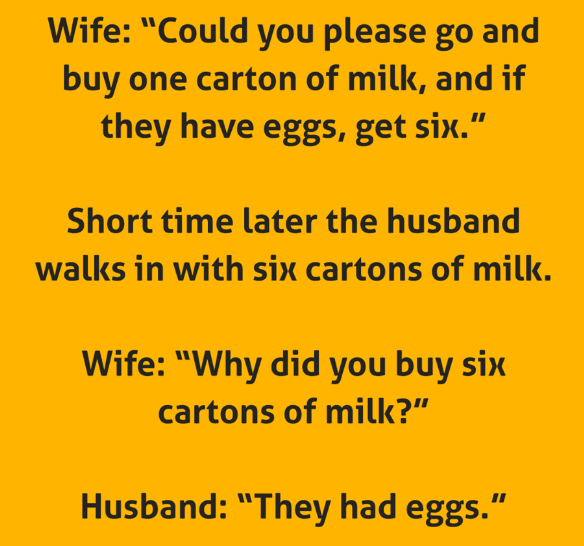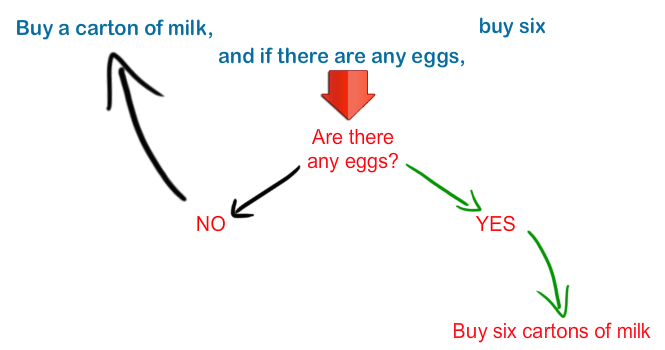The other day a Facebook friend posted this meme on his news feed:

It’s a joke about how husbands and wives often misunderstand each other.
Do you get the joke?
I told my English students the joke in the form of a short story. It went like this:
A Wife’s Request
One morning a wife asked her husband to go and buy some milk at their local grocer’s shop.
“Could you please go and buy one carton of milk, and if they have eggs, get six,” she said.
“Okay,” her husband replied, and went to the shop.
A short time later he walked in with six cartons of milk.
“Why did you buy six cartons of milk?” his wife asked.
“Because they had eggs,” her husband replied.
Comprehension Question
What did the wife want her husband to buy?
Do You “Get” The Joke?
To “get” a joke = to “understand” a joke.
In our story, the joke is about what the word “six” refers to.
Does “six” mean “six eggs” (as the wife intends), or “six cartons of milk” as the husband thinks?
It is often said that men and women, especially husbands and wives, communicate in different ways. The story about milk and eggs is one example of that.
Men Are From Mars, Women Are From Venus
There is a bestselling book about how men and women think differently. It was written by John Gray and first published in the USA in 1992. The title is Men Are From Mars, Women Are From Venus and it quickly became the #1 relationship guide for couples not only in America but around the world.
amzn_assoc_tracking_id = “clevercuckoon-20”; amzn_assoc_ad_mode = “manual”; amzn_assoc_ad_type = “smart”; amzn_assoc_marketplace = “amazon”; amzn_assoc_region = “US”; amzn_assoc_design = “enhanced_links”; amzn_assoc_asins = “0060574216”; amzn_assoc_placement = “adunit”; amzn_assoc_linkid = “de65563ff54968c0d3036c3badea042b”;Once upon a time Martians and Venusians met, fell in love, and had happy relationships together because they respected and accepted their differences. Then they came to Earth and amnesia set in: they forgot they were from different planets.
Based on years of successful counseling of couples and individuals, Men Are from Mars, Women Are from Venus has helped millions of couples transform their relationships.
Back cover, Men Are From Mars, Women Are From Venus
Contextual and Systematic Thinking
Returning to our story about shopping for milk and eggs, it is clear that the husband and wife process information in two different ways.
The wife is thinking and communicating contextually. (This is know asheuristic thinking).
The husband is thinking systematically. (This is known as algorithmic thinking).
The husband follows the grammatical logic of the sentence and ignores the context of his wife’s request.

From a contextual perspective, it seems much more likely that the wife mentioned eggs because she wants “six eggs.”
Also, it is much more usual to buy six eggs than it is to buy six cartons of milk.
Eggs are sold by the dozen and half-dozen. 1 dozen = 12. Half a dozen = 6.
So, from the wife’s point of view, it should be obvious that she wants her husband to buy six eggs if the shop has any eggs.
The Logic of the Sentence
Now let’s look at what the sentence tells us if we read it logically, without thinking about the context:
Buy one carton of milk, and if they have eggs, get six.
The logical flow of the sentence is:
- Buy one carton of milk.
- Do they have eggs?
- If “No,” buy one carton of milk only.
- If “Yes,” buy six cartons of milk.

The phrase, “and if they have eggs” is a sub-clause, placed between commas. Therefore, “get six” refers back to the object of the sentence, “carton of milk.” The presence or absence of eggs defines whether or not the husband buys one or six cartons of milk. It works like a bit like a computer algorithm, without thinking about the context or likely intention of the wife.
